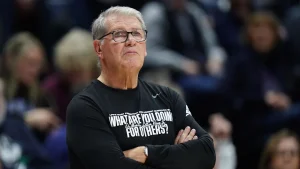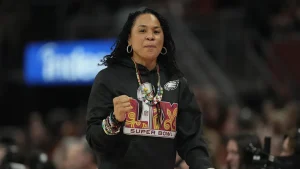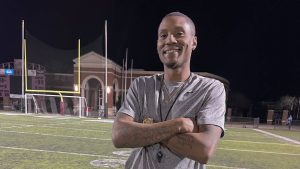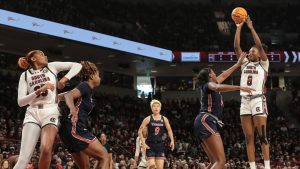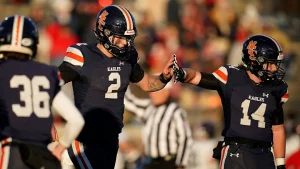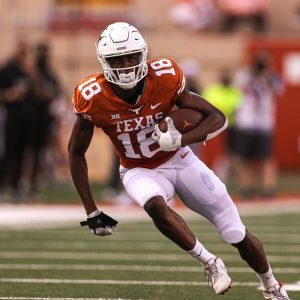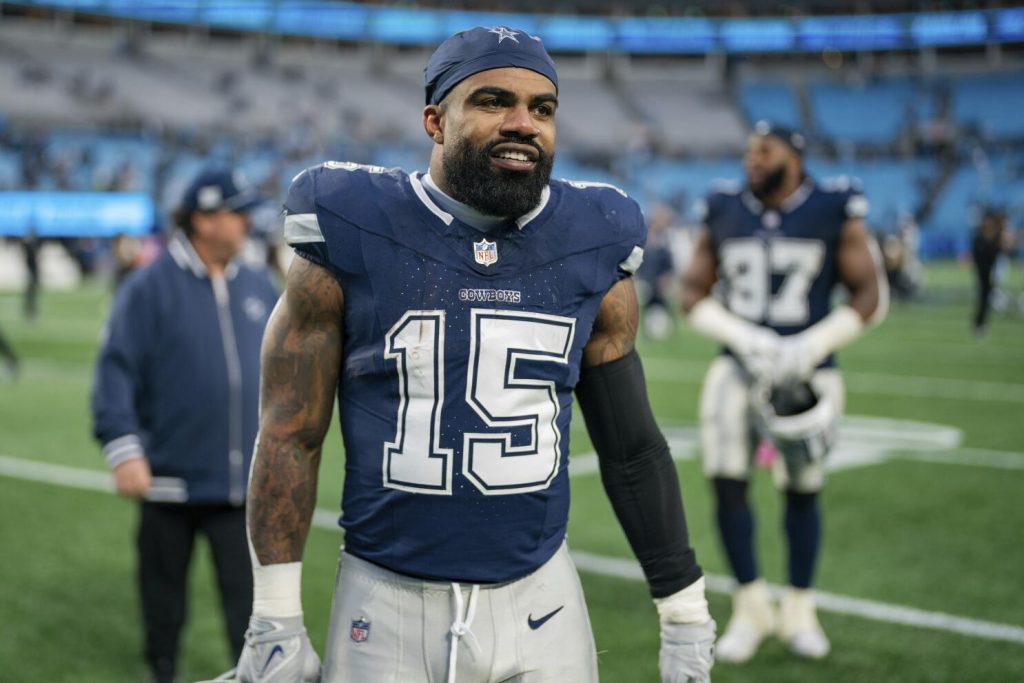
Dallas Cowboys running back Ezekiel Elliott (15) walks off the field after an NFL football game between the Carolina Panthers and the Dallas Cowboys on Sunday, Dec. 15, 2024, in Charlotte, N.C. (AP Photo/Jacob Kupferman)
Micah Parsons criticizes NFL officials for their absurd Super Bowl penalty.
Micah Parsons: A Fierce Advocate for Defensive Players
Micah Parsons, known for his electrifying performances on the field as a linebacker for the Dallas Cowboys, has increasingly used his platform to speak out about issues impacting defensive players, including officiating. His criticisms are significant because they come from one of the league’s premier defenders, a player who embodies the type of intensity and skill that makes the NFL’s defensive strategies so important.
Over the course of his career, Parsons has demonstrated not only his on-field talent but also his understanding of the intricacies of the game. His ability to analyze the broader dynamics of the NFL has gained him a reputation as a thoughtful player who’s willing to push back against what he perceives as a tilt in the league’s priorities toward offense.
In an era dominated by record-breaking offensive performances, players like Parsons see the limitations placed on defensive tactics as a growing problem. While rules protecting quarterbacks and minimizing hits on wide receivers have been implemented with good intentions, some defensive players argue that they unfairly restrict their ability to play the game as it was designed.
Parsons on the “Absurd” Super Bowl Penalty: A Deeper Dive
Following Super Bowl LVIII, which was filled with moments of both offensive brilliance and defensive frustration, Parsons voiced his displeasure with one of the game’s most controversial penalty calls. The call in question came when a defensive holding penalty was assessed on a critical third-down play that many believed swung momentum in favor of the Chiefs.
Parsons, like many defensive players, felt that the penalty was a product of the league’s trend of protecting offensive players to the point where defenders are left with fewer tools at their disposal. In his tweet, he noted that defensive holding calls often feel arbitrary, and the inconsistency in how these penalties are enforced leads to a sense of injustice. For Parsons, it was a clear example of what he perceives as the NFL’s bias toward offensive play.
When he referred to the league as “ruining defense,” he was underscoring a recurring concern. As the NFL has evolved, the role of defensive players has been increasingly marginalized by changes meant to protect players, enhance scoring, and entertain fans. Parsons’ comments reflect the broader frustration that many defenders feel regarding the balance between offense and defense in the league.
The Declining Role of Defense in the NFL
Over the last two decades, the NFL has seen a significant shift toward higher-scoring games. Rule changes designed to protect quarterbacks, reduce violent hits on receivers, and penalize certain types of tackles (such as helmet-to-helmet hits) have undoubtedly increased offensive production. This has created a more fan-friendly, pass-heavy game, but it has also made it more difficult for defenses to have a significant impact on games.
One of the most glaring examples of this shift is the increased penalty for what many players consider routine contact during defensive plays. Penalties such as “roughing the passer” or “defensive holding” have been enforced with more stringency in recent seasons. In some cases, defenders feel these calls are made to enhance the star power of quarterbacks like Patrick Mahomes or Tom Brady, whose ability to lead high-powered offenses is the main draw for casual fans.
For a player like Parsons, who thrives on physical play, these rule changes can be incredibly frustrating. Defensive players are often expected to contain fast, dynamic offensive weapons while simultaneously avoiding any contact that might result in a penalty. To Parsons and other defenders, this creates a paradox where they are incentivized to be passive rather than aggressive, reducing their impact on the game.
The “NFL is Ruining Defense” Debate: A Growing Concern
Parsons isn’t alone in his criticism of the league’s direction. His sentiments are echoed by several players across the defensive spectrum who believe the game’s evolution is unfairly skewed in favor of offensive production. Take, for example, former defensive greats like J.J. Watt, who have lamented that the physicality that once defined the NFL is slowly being legislated out of the game.
For these players, the current state of the game feels like a distortion of the traditional balance between offense and defense. They believe that a defender’s ability to disrupt plays, sack the quarterback, or stop the run should not be penalized to the extent that it undermines their efforts. Defensive players are tasked with keeping offenses in check, but they have fewer avenues through which they can truly affect the game. This has left many of the league’s top defenders frustrated.
Impact of Offensive Rules on Game Strategy
The NFL’s rules, particularly those relating to quarterback protection, have changed the strategic calculus for teams. In the past, defensive coaches had the freedom to unleash more aggressive blitzes, implement daring coverage schemes, and rely on physicality to win matchups. Today, that’s no longer the case. The NFL’s emphasis on protecting quarterbacks has forced coaches to rethink their defensive strategies.
For example, a quarterback who feels too much pressure from a defense might quickly release the ball or seek a roughing penalty, knowing that an ill-timed hit can be penalized severely. As a result, defensive coaches have increasingly been forced to adapt by focusing on schemes that generate pressure without drawing flags, leading to a less aggressive and more conservative defensive approach.
Defenders like Parsons often have to hold back in these situations, worried that any slight infraction might result in a penalty. This reduces the defense’s effectiveness and allows offenses to gain an upper hand, further intensifying the frustration felt by defensive players.
The Larger Implications for the NFL: Balancing Entertainment and Competition
Ultimately, the debate about the balance between offensive and defensive play is not just about the players on the field. It also has significant implications for the NFL’s long-term strategy as a business. As the league has shifted toward promoting high-scoring games, the focus has also shifted to the stars who drive those performances: the quarterbacks, wide receivers, and running backs.
While the NFL has undoubtedly succeeded in making the game more entertaining and accessible to a wider audience, there’s a growing concern that the league is inadvertently weakening the competitiveness of the game. If defenders are consistently constrained by overly stringent rules, the NFL risks losing one of the defining elements of football—its strategic depth.
As more fans and analysts discuss this issue, it’s clear that the NFL must find a way to address these concerns without compromising the excitement the game provides. The balance between offense and defense should be maintained, and all players, regardless of position, must feel that they have an equal opportunity to showcase their skills.
Parsons’ Role in Shaping the Conversation
As a player with considerable influence, Micah Parsons is in a prime position to continue advocating for change within the NFL. His vocal stance on officiating issues and the state of defense in the league brings attention to a topic that many players feel has been underrepresented. By speaking out on social media and in interviews, Parsons has opened up a broader conversation about the future of the league.
Given his talent and status as one of the league’s brightest stars, Parsons has the potential to become a leading figure in the fight for more balanced rule enforcement. He can continue to use his platform to push for changes that ensure defensive players aren’t unfairly penalized. Whether through changes to how penalties are called or adjustments to the rules governing defensive contact, Parsons’ advocacy could influence the NFL’s evolution.
The Future of NFL Officiating and Defense
Micah Parsons’ criticisms reflect a broader, growing conversation about the future of the NFL. As the league continues to prioritize offense and scoring, it’s essential that defensive players’ contributions are not overlooked or minimized. The balance between offense and defense is key to the NFL’s success, and as players like Parsons continue to advocate for change, the league may find new ways to keep the game exciting without sacrificing the integrity of the defense.
By shining a light on the issue, Parsons has become more than just a player voicing frustration; he’s a catalyst for change, challenging the NFL to rethink its approach to officiating and the rules that govern how the game is played. How the league responds to these concerns could reshape the future of football, ensuring that both sides of the ball are given a fair chance to compete on equal footing.
